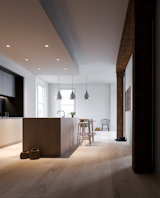The Last DUMBO Loft Conversion Offers Luxe Living for $1.4M
The DUMBO of today is often associated with trendy cafes and striking riverfront views of downtown Manhattan. Still, the historic district remains an integral part of Brooklyn's industrial history, evident by blocks of former factories from the late 19th and early 20th centuries. Following on years of transformation in the neighborhood, Alloy Development is leading the residential loft conversation of two buildings that are among some of the last vacant structures in the neighborhood.
At the corner of Jay and Plymouth Streets are two structures built by Masury & Sons Paint Works, once among the most important paint manufacturers in the U.S. The company's founder, John W. Masury, was a prolific inventor, patenting early methods of grinding paint in oil and an easy-open metal lid, which enabled the sale of ready-made paints.
A 1911 advertisement from Masury described the original brick and timber building during the heyday of DUMBO industrialism: "On the first floor is the shipping room, holding thousands of cans of paint to be sent to all parts of the world. Another floor is devoted to the grinding department. Outside, lines of wagons and auto trucks await."
According to the 2007 DUMBO designation report from the New York City Landmarks Preservation Commission, the second concrete building located at 42 Jay Street replaced a one-story brick shed erected by the company in 1891. The seven-story structure included "facilities for the manufacture of flat white paints and enamels, a chemical laboratory, a floor for making sample cards, and, on the top floor, executive offices."
According to the same designation report, Masury & Sons Paint Works moved its manufacturing work to Baltimore, Maryland, in 1945 and was purchased by Valspar in the late 70s. The former factory and distribution center will now live on as residential lofts, with modern designs that pay homage to the building's industrial character and style. Keep scrolling to see more of the plans, with four types of homes starting at $1,400,000.
Townhouses
A separate entryway for the rest of the building will be located along the cobblestoned Plymouth Street, allowing residents to enjoy framed views of the Manhattan and Brooklyn Bridges on a daily basis. A private entry courtyard is planned in back, complete with reclaimed cobblestones and granite blocks, along with dogwoods, magnolias, and other native plantings.
Brick & Timber Homes
Daylight Factory Homes
Modern Penthouses
Five distinct new penthouses will sit atop the historic structures. The design of the two above the brick and timber building features unique arches that open up to large terraces spanning the width of the building. The remaining three penthouses on top of the concrete building will feature glassy facades that opens up to panoramic views.
"We envisioned 168 Plymouth to be a contextually sensitive addition to the historic Dumbo neighborhood it joins," says Jared Della Valle, CEO and co-founder of Dumbo based real estate company Alloy Development. "As one of the last loft conversions in Dumbo, it was important for us to protect the unique character and feel of each building."
A birds-eye view looking west down Plymouth Street toward the Manhattan Bridge and Brooklyn Bridge Park. The new glassy penthouses are juxtaposed with the concrete building's Arts and Crafts-style cornice, while the adjacent building's penthouses mimic the rounded arch style of their brick and timber counterpart.
Residences at 168 Plymouth range from one-to-four-bedrooms, with a mix of townhouses, lofts, and modern penthouses starting at $1,4,00,000 and going up to over $6,000,000. For more information, visit the property website or contact Karen Heyman of Sotheby's International Realty.
Related Lofty Reading:
A Historic Propeller Factory Is Converted Into a Gorgeous Home
Rent One of These Stunning Lofts in a Converted Brooklyn Church
Know of a home for sale or rent that should be featured on Dwell.com? Find out how to submit to Dwell.
Published
Last Updated
Topics
Real EstateGet the Real Estate Newsletter
From midcentury classics to the best contemporary spaces for sale, see the latest listings for modern homes on the market around the world.











